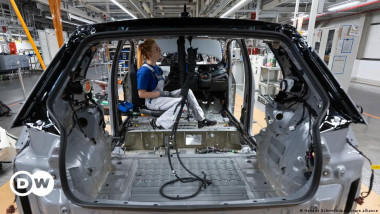Germany: Factory output plunges amid economic gloom
Germany’s industrial output fell for a second consecutive month in June, figures published on Monday show, with a drop of 1.5% far wider than the previous month’s slip of 0.1%.
The German Economy Ministry warned that high energy prices and interest rates had taken their toll, despite rising demand.
The slump in output was greater than had been expected by analysts polled by finance data firm Factset, who had predicted a 0.5% decline.
Germany’s traditionally strong automobile sector showed a significant fall of 3.5%, after production in the sector increased by 5.8% the previous month. The construction industry, at minus 2.8%, also brought down the overall result.
“The outlook for the industrial economy remains gloomy despite the rising demand because these are strongly affected by fluctuations of big orders,” the Economy Ministry said.
“Given the subdued business and export expectations of companies, there is currently no sign of a noticeable recovery.”
ING analyst Carsten Brzeski said the latest data was “another illustration of the country’s ongoing stagnation” adding that it could also be an omen of further bad news for gross domestic product (GDP).
“With today’s numbers, the risk has increased that the flash estimate of stagnating GDP growth in the second quarter could still be revised downwards,” Brzeski said.
“The poor mood among companies indicates persistent lethargy,” said the Hauck Aufhäuser Lampe private bank’s chief economist, Alexander Krüger.
As the energy crisis precipitated by Russia’s invasion of Ukraine began to bite, bringing higher inflation and interest rates, Europe’s largest economy unexpectedly slid into recession in late 2022 and early 2023.
The German Bundesbank predicts that the country’s economy will contract by 0.3% in 2023.
On the positive side in the latest figures, pharmaceutical industry output boosted the overall result with growth of 7.9% after production fell by 13.3% in May.
